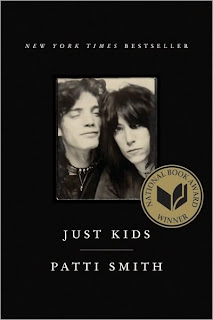Recently, news broke that Mike Daisey's report for TAL was partly falsified. So much response to that on all fronts. Well actually I don't think I had a real life conversation about it, but I saw multiple blog posts and articles (is the difference between an article and a blog post only who publishes it?) and tweets. All the sentiments can be mostly summed up in these two tweets of @KateHarding:
___________________________________________________________________________________
 Kate
Harding
@KateHarding
Kate
Harding
@KateHarding
(sorry, I don't feel like going through that whole Print Screen business right now)
So Daisey mostly told the truth about the conditions at Foxconn but was not true to facts* when discussing his meetings with Foxconn employees / injured people, notable the guy who swipes the iPad open and calls it "magic" or the people with the health damages from the dries-faster-than-alcohol cleaner. This is a problem because it's very easy to make up something that is compelling and it's much harder to find the compelling nugget in a fact-based story.
*by "facts" I mean THINGS THAT ACTUALLY HAPPENED
For example, to hear that 90% of what Planned Parenthood does is abortion is much more arresting than 3%. This figure makes you move, makes you shout WHAT and clammor for more information. Three percent is like, whatever, fine, that's what I expect I guess or something, who actually cares, PP does all kinds of health services. So when you learn it IS 3%, and that you'd been fed 90% for inflammatory purposes (Jon Kyl said he wasn't trying to be "factually accurate"), you never forget that it's 3%.
I guess what can be good about distortion--or any kind of aggrandized statement--is that distortion garners attention and press. Maybe Daisey would have better luck passing off his carelessness as determined misinformation to galvanize activists, or Apple, to take action.
A couple weeks ago the NYTimes Book Review published a front-page article on John D'Agata's twists of FACTS towards a shady aim: "beauty," that elusive beast. He claims that as an essayist, not a reporter, he doesn't have an obligation to tell "the truth." Hey, you know me; you know I'm a big believer in subjectivity, multiple truths, and conflicting realities. One would be naive to think we don't live in a world of multiple realities: look at the US Congress, can't barely do a thing, everyone thinking their reason is the best reason! My problem with D'Agata is that he's trying to change all these small bits of information to make a better story, and that's not good writing. That's not effort. That doesn't produce art. And the base things he's trying to change to make his story more compelling aren't even a big deal to begin with.
Daisey changed compelling facts in the name of truth. D'Agata changed uninteresting facts in the name of art. And there's nothing more to this post than that these manipulations are a recent coincidence I've been thinking about.
___________________________________________________________________________________
 Kate
Harding
@KateHarding
Kate
Harding
@KateHarding
Making shit up and calling it nonfiction
rejects both challenges. It's about manipulating the audience, not
creating art.
___________________________________________________________________________________(sorry, I don't feel like going through that whole Print Screen business right now)
So Daisey mostly told the truth about the conditions at Foxconn but was not true to facts* when discussing his meetings with Foxconn employees / injured people, notable the guy who swipes the iPad open and calls it "magic" or the people with the health damages from the dries-faster-than-alcohol cleaner. This is a problem because it's very easy to make up something that is compelling and it's much harder to find the compelling nugget in a fact-based story.
*by "facts" I mean THINGS THAT ACTUALLY HAPPENED
For example, to hear that 90% of what Planned Parenthood does is abortion is much more arresting than 3%. This figure makes you move, makes you shout WHAT and clammor for more information. Three percent is like, whatever, fine, that's what I expect I guess or something, who actually cares, PP does all kinds of health services. So when you learn it IS 3%, and that you'd been fed 90% for inflammatory purposes (Jon Kyl said he wasn't trying to be "factually accurate"), you never forget that it's 3%.
I guess what can be good about distortion--or any kind of aggrandized statement--is that distortion garners attention and press. Maybe Daisey would have better luck passing off his carelessness as determined misinformation to galvanize activists, or Apple, to take action.
A couple weeks ago the NYTimes Book Review published a front-page article on John D'Agata's twists of FACTS towards a shady aim: "beauty," that elusive beast. He claims that as an essayist, not a reporter, he doesn't have an obligation to tell "the truth." Hey, you know me; you know I'm a big believer in subjectivity, multiple truths, and conflicting realities. One would be naive to think we don't live in a world of multiple realities: look at the US Congress, can't barely do a thing, everyone thinking their reason is the best reason! My problem with D'Agata is that he's trying to change all these small bits of information to make a better story, and that's not good writing. That's not effort. That doesn't produce art. And the base things he's trying to change to make his story more compelling aren't even a big deal to begin with.
Daisey changed compelling facts in the name of truth. D'Agata changed uninteresting facts in the name of art. And there's nothing more to this post than that these manipulations are a recent coincidence I've been thinking about.




